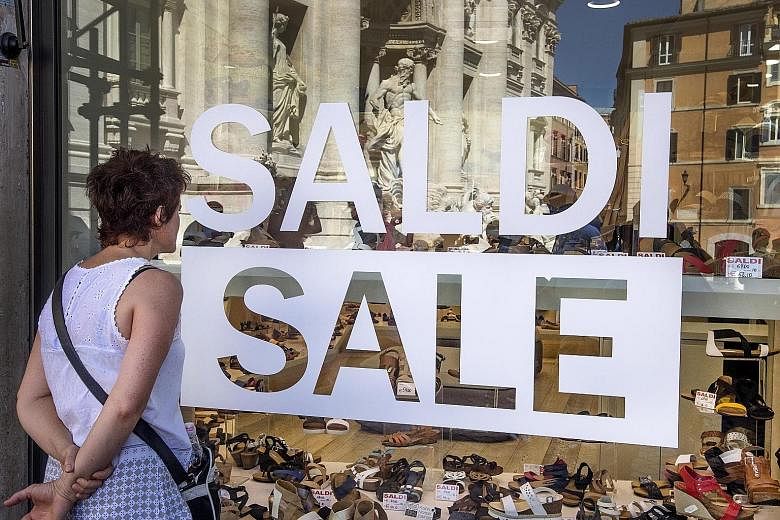ROME • Italy's bank shares have plunged, shaking the financial foundations of the euro zone's third- largest economy and threatening contagion to other EU nations.
The crisis could push Italy back into recession and, in a doomsday scenario, generate a Greek-type meltdown that Europe would find almost impossible to contain.
Italy's banks are suffocating under a pile of non-performing loans and, adding to the growing sense of instability, Prime Minister Matteo Renzi has promised to resign if he loses a referendum in October on constitutional reform. Recent opinion polls say he will fall well short.
Italy cannot afford further financial upheaval. It has the heaviest public debt burden in Europe after Greece - some 133 per cent of GDP - and is ill placed to pump funds into its crumbling banks, which are burdened by some €360 billion (S$540 billion) of doubtful and bad loans, equivalent to almost a quarter of gross domestic product.
But it is also at risk of tumbling into a vicious economic circle. Without help, the ailing banks have little room to offer credit, thereby crimping the sickly economy, which has barely grown since the birth of the euro in 1999.
Italy's bank sector index has fallen 30 per cent since Britain voted on June 23 to quit the EU, bringing its losses so far this year to 57 per cent.
"Italy is essentially the fault line of Europe," said a former IMF official, speaking on condition of anonymity. "Both the public debt and the banking sector are on a powder keg, being maintained by a process of non-recognition of accumulated losses in the system that they keep rolling over. The real problem is that somebody has to take the losses eventually."
Immediate concerns centre on the country's third-largest lender, Banca Monte dei Paschi di Siena (BMPS), which has the highest ratio of bad debts to outstanding loans among listed Italian banks. It has been told by the European Central Bank to slash these debts by 40 per cent over three years.
Late on Tuesday, market watchdog Consob said short selling of BMPS shares would be banned in today's trading session. Such bans aim to prevent speculators from forcing stocks down by selling borrowed shares heavily and then buying them back at a lower price, pocketing the difference.
Rome is in talks with Brussels to devise a plan to recapitalise its lenders, including BMPS, hoping to use public money to stave off potentially huge losses for bank bond and shareholders - many of them ordinary retail investors.
Such a deal might require the bending of anti-bailout rules that the European Union adopted in 2014 to force investors and some depositors to share the burden of bank failures.
"A solution should be found quickly or the world's oldest bank (BMPS) could fail and bring down the rest of Europe's embattled banking sector with it. The EU needs to show flexibility or Italy could go under," said Mr Andrew Edwards, CEO of British-based financial company ETX Capital.
REUTERS

